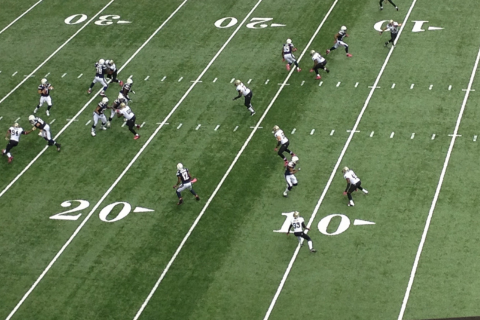 I’m not a big TV-watcher, but once in a while something grabs my attention and I get obsessed. Apple TV+‘s Ted Lasso is my current obsession.
I’m not a big TV-watcher, but once in a while something grabs my attention and I get obsessed. Apple TV+‘s Ted Lasso is my current obsession.
For those who haven’t seen it, the show is about an American football coach named Ted Lasso (played by Jason Sudeikis) who’s hired to coach soccer in the UK. The team’s owner hired him in an attempt to spite her ex-husband, hoping Lasso would fail and sink the team. I resisted watching the show at first because I was certain it would overlook and gloss over important coaching topics. I assumed it would leave me frustrated by misrepresenting performance psychology, athletic coaching, team dynamics, wellness, and mental health, among other things.
 But then, I watched it. And I watched it again. And again and again.
But then, I watched it. And I watched it again. And again and again.
In fact, last week I tried to watch it on a night that it wasn’t on! Suddenly, I was addicted. The characters seem so real to me. I love being transported away from real life and to some altered universe with characters that I actually think could be real. That’s pretty rare for me to feel, but it happens with Ted Lasso. I guess that’s the power of television, books and movies – the characters and the story seem real, and the messages sent all get into your head and you don’t even realize it.
Of course, nothing in life is perfect, and this show, like anything else, has its flaws. But I still think it’s entertaining and funny while somehow also thought-provoking and deep. It wrestles with topics like gender roles, toxic masculinity, vulnerability, toxic positivity and, of course, performance psychology. But, importantly, it doesn’t make light of these things or reinforce maladaptive, unhealthy, or destructive stereotypes.
Ted Lasso struggles with panic. He shows how panic grips you physically and emotionally, coming over you with no warning. Another character, Jamie Tartt, is rude, arrogant, self-centered and downright mean. He’s quite unpleasant and unlikeable. Suddenly, his father enters the scene sort of out of nowhere and treats him terribly.
What do these two characters have in common? Both try to ignore their pain, avoid their feelings, and push ahead without taking care of themselves emotionally. And their problems get worse. You watch how Ted ignores his panic and how, over time, it grows and grows — as problems that need to be addressed will do. Finally, he reaches out for help. You watch Jamie Tartt ignore his pain, make terrible decisions, and lose a lot in the process. Then he decides to change.
 As a coach, I see this happen over and over again. We ignore our problems when we could save ourselves a lot of misery by tackling them head-on. I also see the opposite happen, where we just ruminate about our problems, running scenarios over in our heads repeatedly. We get the same result as when we ignore problems: they usually get worse.
As a coach, I see this happen over and over again. We ignore our problems when we could save ourselves a lot of misery by tackling them head-on. I also see the opposite happen, where we just ruminate about our problems, running scenarios over in our heads repeatedly. We get the same result as when we ignore problems: they usually get worse.
What does coaching look like for real-life people like Ted and Jamie? We talk about the problem — whether it’s relationships, anxiety, or something else — just enough so we understand what’s going on. That problem, however, would not be the focus. We focus on who YOU are — your values, beliefs, strengths, and what you want to change. We develop clear goals and define action steps to reach them. A question I always ask is, “When you finish coaching, what will be different in your life?” We build on that to create your goals. In the process, we talk about the inevitable obstacles and strategize about how to cope with them. We think about the many ways in which you have dealt successfully with problems, and how you might be able to use those skills in the current situation. We also talk about ways to build new skills. We focus on how you can use your many strengths and skills to create change in your life. We do that because that is what the research and my over 30 years of experience shows is how we grow and change!
Watching Ted Lasso, in many ways, is similar to what I experience as a coach. I become immersed in the world of the characters. In coaching, I connect with amazing people (real ones!), learn about their worlds and their stories, and help them create the change they are seeking in their lives. I always learn so much along the way.
So, I am actually grateful for this TV show. I think that it has the power to help people IGNITE change in their lives.
